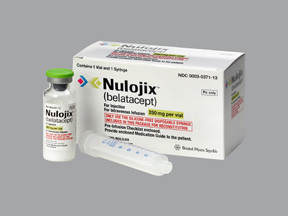BELATACEPT - INJECTION
PHONETIC PRONUNCIATION: (bel-AT-a-sept)
COMMON BRAND NAME(S): Nulojix
GENERIC NAME(S): belatacept
Uses
USES: Belatacept is used to help prevent organ rejection in people who have received a kidney transplant. It is used along with other medications (such as mycophenolate, corticosteroids) to allow your new organ to function normally. Belatacept belongs to a class of drugs known as immunosuppressants. It works by weakening your body's natural defense (immune system) to prevent your body from rejecting the new kidney.
How to use BELATACEPT - INJECTION
HOW TO USE: Read the Medication Guide provided by your pharmacist before you start using belatacept and each time you get a refill. Your doctor may direct you to enroll in a special program from the manufacturer (ENLIST Registry) before using this medication. If you have any questions, ask your doctor or pharmacist. This medication is given by injection into a vein as directed by your doctor, usually over 30 minutes. After the first dose, this medication is given on a regular schedule as directed by your doctor. The dosage is based on your weight. Do not increase your dose or use this drug more often or for longer than prescribed. Your condition will not improve any faster, and the risk of serious side effects may increase. If you are giving this medication to yourself at home, learn all preparation and usage instructions from your health care professional. Before using, check this product visually for particles or discoloration. If either is present, do not use the liquid. Learn how to store and discard medical supplies safely. This medication can increase your risk for serious (even fatal) infections, such as cytomegalovirus or pneumocystis. To help prevent these serious infections, your doctor may direct you to also take other medications along with belatacept. Ask your doctor for details. (See also Precautions section.) You should receive this medication regularly to get the most benefit from it. To help you remember, mark your calendar to keep track of when to receive the next dose.
Side Effects
Precautions
Interactions
Overdose
Images
Reviews
Faq for BELATACEPT - INJECTION
Belatacept is used to prevent organ rejection in adults who have received a kidney transplant.
Belatacept works by inhibiting the activation of a certain type of immune cells known as T-cells, which helps prevent rejection of the transplanted kidney.
Common side effects of belatacept include cough, diarrhea, headache, high blood pressure, and constipation. It may also increase the risk of infections and certain types of cancer.
Belatacept is given as an intravenous (IV) infusion over several hours. The dosage and frequency of administration may vary depending on the patient's individual needs and response to the medication.
Belatacept is typically taken for as long as the patient's transplant is functional and they do not experience significant side effects or rejection episodes. The duration of treatment will be determined by your healthcare provider.
Belatacept is not approved for use in children or adolescents below the age of 18 years.
To reduce the risk of infections, it is important to follow good hygiene practices, avoid close contact with people who are sick, get vaccinated as recommended, and notify your healthcare provider of any signs of infection.
Belatacept may interact with certain medications, so it is important to inform your healthcare provider about all the medications, supplements, or herbal products you are taking before starting treatment with belatacept.
It is generally recommended to limit alcohol consumption while on belatacept treatment as alcohol can have negative effects on the liver and immune system. However, it is best to consult with your healthcare provider for personalized advice.
Warning
WARNING: This medication may increase the risk for developing serious (even fatal) infections or certain cancers after receiving a kidney transplant. Belatacept may also increase the risk for developing a certain medical condition, post-transplant lymphoproliferative disorder (PTLD), which can become a type of cancer. The risk is greater in people who have not previously been exposed to a certain virus (Epstein-Barr virus) that causes a common mild infection, usually before adulthood. Before starting treatment with this medication, your doctor should test you to check if you have had previous exposure to Epstein-Barr virus. (See also the Medication Guide.) This medication is not recommended for use to help prevent organ rejection after a liver transplant.
Disclaimer
IMPORTANT: HOW TO USE THIS INFORMATION: This is a summary and does NOT have all possible information about this product. This information does not assure that this product is safe, effective, or appropriate for you. This information is not individual medical advice and does not substitute for the advice of your health care professional. Always ask your health care professional for complete information about this product and your specific health needs.

No Reviews Yet